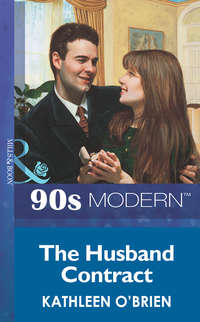
Полная версия
A Self-Made Man
Lacy smiled at the family who waited in front of her now. She had just taken their picture—proud father, ecstatic mother, robustly wriggling baby girl. Yes, she thought, handing the daddy his camera. This was better. Much better.
“Take the baby, would you please, Mrs. Morgan? We want a picture of you two together. We wouldn’t ever have made it though all this without you.”
With pleasure, Lacy accepted the beautiful, pink-faced infant, who was finally going home after three weeks under ultraviolet lights in the nursery. It had been touch-and-go, but this little one was a fighter. Lacy whispered soft nothings and let the amazingly delicate fingers wrap around her thumb.
Soon, when the hospital had its own neonatal unit, these success stories would be commonplace. Small miracles on a daily basis, and she would be a part of that. A worthwhile life, surely. Even if none of the miracles were her own….
The father’s enthusiasm knew no bounds, and he kept the flash popping even after Lacy’s eyes were half-blind with red after-images, even after his tiny daughter had begun to wail in bored protest.
“Mr. Rosterman, perhaps it’s time to take—”
“Lacy?” Kara Karlin’s worried voice broke in. “Can I speak to you a moment?”
Lacy looked over toward the maternity ward door, and saw Kara’s wrinkled brow and pursed lips. She knew that look. Something was wrong. Shifting the baby to her shoulder, where her cries subsided slightly, Lacy left the parents struggling to get a new roll of film into their camera and moved to where Kara stood wringing her hands.
“Lacy, I’m so sorry. I really hate to bother you, but the most awful thing has happened.”
Lacy smiled. Though Kara was nearly fifty and the seasoned mother of four, she lived and breathed superlatives like a teenager. Everything that happened to her was the most something—most terrible, most wonderful, most horrifying, most exciting. All peaks and valleys. Lacy, who had carefully tethered her own psyche to a flat, uneventful plain for years, realized that she sometimes took a vicarious pleasure in watching Kara roller-coaster through her days.
“Surely not the most awful,” Lacy teased, patting the baby’s back softly. “The Most Awful thing happened yesterday, didn’t it, when the caterer brought the wrong hors d’oeuvres to the auction? And yet somehow we survived.” She swayed slightly as she talked, creating a gentle rocking motion. The baby began to suck her fingers placidly, and the quiet was blissful. “We even managed to raise a quarter of a million for the neonatal unit.”
Kara scowled. “Laugh if you like, but if old Mr. Terwilligan had touched one of those seafood canapes, his throat would have swelled up like a blow-fish.” She brushed her damp, graying hair back from her temples. “And besides, this is worse. You won’t believe it, Lacy. The birthday clown is sick. We haven’t anyone to do the basket thing.”
Now that was a problem. The entire pediatric ward was practically holding its breath, awaiting the clown visitation and the attendant shower of toys and candy from his huge green basket. To disappoint the children would be unthinkable.
And therefore Lacy simply wouldn’t let it happen. “We’ll have to find a replacement,” she said calmly, her mind scanning the possibilities like a computer. “Is Leo working today?” Kara shook her head mournfully. “Bart?” Another negative. “Roger?”
“We don’t have a single man in the community relations department today. Oh, what are we going to do? The kids are so excited. Ronny Harbaugh was up all night.”
“Now, Kara, don’t panic.” Lacy concentrated on slowing her breath, lowering her voice, communicating serenity both to the suddenly restless baby and to the older woman, who seemed about to burst into tears.
Rotating the baby to her other shoulder, she studied the possibilities. “No men at all. What about a woman, then?”
Kara looked blank. “But we always use a man. The costume is huge. The eyes are so high—”
“Then we need a tall woman.” Lacy scanned Kara’s trim five-feet-ten inches. “What about you?”
Kara looked stunned, confused by this departure from tradition, terrified at the sudden responsibility. “Oh, I couldn’t. I’ve never… We’ve never… I just couldn’t.” But she wanted to. Lacy could see a tremulous hope in her eyes. “Could I?”
“Of course you can,” Lacy said steadily, putting her free hand on the other woman’s shoulder. “The kids all love you. You’ll be wonderful.”
“But I can’t.” Kara braided her fingers anxiously. “Oh, my goodness, the newsletter! And I was just about to—”
“It doesn’t matter. I’ll help you get the newsletter sent out. Whatever else there is can wait.”
“No, really, this can’t.” Groaning softly, Kara gnawed on one already-tortured fingernail. “Oh, this is the worst luck! I was just about to give a tour—”
“I’ll take the tour.” Lacy put a little steel in her voice, though she still smiled encouragingly. “Now for heaven’s sake, Kara, stop worrying and start dispensing birthday presents before Ronny Harbaugh starts a riot in the pediatric ward.”
Kara’s answering smile was equal parts gratitude and anxiety. “Oh… All right, I will, then!” She bustled toward the hallway, turning back at the last minute, her face lit with a new inspiration. “You know, you probably should conduct this tour, anyhow, since you’re the director. He’s not just any investor. He’s the type who’d expect the red carpet treatment, isn’t he?”
Lacy’s stomach went suddenly cold. She gripped the infant more carefully as she felt the room take a quick, violent tilt and right itself in the blink of an eye. Aware of the baby’s parents watching her with a sudden, instinctive anxiety, she fought the urge to follow Kara down the hall.
“He?” She spoke loudly enough to reach the bank of elevators where Kara waited. Her voice sounded normal, thank God. “Who?”
But she knew. She knew even before Kara stepped into the waiting elevator and turned with the name on her lips. “Only the most gorgeous man on Pringle Island, you lucky thing,” Kara called back. “Only that hunky Adam Kendall.”
HE HAD TO GIVE HER CREDIT. The lady had guts.
Adam raised one eyebrow as he watched Lacy coming toward him, her posture erect, her chin high and set. Even though Kara Karlin had popped in about half an hour ago to promise that Lacy would be arriving soon, still Adam would have bet his left cuff link that she’d never show. The tour would be quietly foisted off onto some underling.
He had assumed, in fact, that it was Lacy’s search for a suitable underling that had kept him cooling his heels here in the waiting room of the community relations department. Not that he’d minded—the room was designed for comfort. The chairs opened roomy, inviting arms to visitors. Peach pillows as soft as upholstered clouds tumbled across the sofa. Cheerful apricot artwork smiled from behind the desk. Gentle, indirect lighting spread a buttery glow over every wall.
The room positively oozed warmth. Lacy Morgan, however, stopping now in the doorway to take a deep breath, did not.
Dressed in a knife-slim, glacial-blue suit, her long, thick hair pulled back into a cruel, shining knot at the nape of her pale neck, she affected the room like a blast of refrigeration. She didn’t hurry, even after she saw him sitting there. She smoothed her sleeve carefully, then touched the top button of her collar, which was high, slightly Oriental, and clearly in no danger of slipping open—now or ever. Then she moved to her desk, a study in graceful efficiency. Her slim heels clicked against the wood flooring with a sound that reminded him of ice falling into an empty glass.
She fingered a few papers pointlessly, then looked up, gazing at him with a cold calm. “Kara tells me she promised you a tour,” she said politely. “I’m sorry to have kept you waiting.”
“Really.” He smiled. “Are you sure?”
She obviously hadn’t expected that. A faint line marred the snowy placidity of her forehead before she caught herself and smoothed it away. “Sure of what?”
“That you’re sorry to have kept me waiting.” He hitched one leg over the other and watched her from the comfortable embrace of the armchair. “After last night, I thought perhaps you might have welcomed the opportunity to…put me in my place.”
“Your place, Adam?” She shook her head. “I wouldn’t presume to know where your place might be.”
“Well,” he murmured. “Under your thumb, perhaps?”
She laughed, a brittle sound that once again reminded him of ice cubes tinkling against crystal. “Actually, the last time I remember thinking about where you should go, it was somewhere considerably farther south. And somewhat warmer.”
“Oh?” He smiled and let his gaze travel slowly south across her body. He couldn’t help himself. He knew what she meant, of course—that he belonged in the lowest level of Hell. But she wasn’t very good at this game, was she? She had thrust, but the effort had left her exposed.
In the space of two hot, blinking seconds, she knew how it had sounded. Her eyes widened, and her fingers tightened on the papers they held.
He didn’t speak. He didn’t have to. He waited for the signature cherry-red circles to bloom in her cheeks. She had always been a blusher. She had blushed when Mrs. Bickens called on her in Calculus, when Adam’s fellow construction workers whistled at her as she picked him up after the late shift, when her aunt scolded her for coming in beyond the stroke of midnight….
And, with an intoxicating innocence that had sent quakes through his entire system, she had blushed in his arms when he undressed her. Though they had been alone in the melting summer darkness, it had taken a dozen murmuring kisses to coax her fingers away from her burning cheeks.
But, to his surprise, she didn’t blush now. If anything, her strangely immobile face, ivory under its weight of dark hair, grew even more pale.
She stared at him a long moment and then, slowly, she came around the desk and leaned against the corner. She adjusted her skirt with graceful hands. A wink of silver at her wrist showed beneath her cuff and a scallop of white lace retreated obediently under her hem.
The shift brought their knees together, separated by no more than a sliver of an inch. It was deliberate—he could see the challenge in her steady gaze. She was completely unaffected, she was assuring him, by both his words and his body.
“Perhaps we’d better get something straight,” she said in a voice that was commendably even, if not quite natural. “Touring potential investors is part of my job. Don’t flatter yourself that I would let anything you did in the past—last night or ten years ago—keep me from raising money for this hospital.”
He stared back at her, realizing that suddenly, absurdly, he was angry. Angry at that marble-statue face, at that automaton voice, at those graceful hands that no longer trembled. What a waste. What a criminal waste of sweet fire and flesh and blue-moonlight blushes.
What the hell had she turned herself into? And, more to the point, why did he give a damn?
“Don’t worry, Lacy,” he said with another cold grin, this one curving to within an inch of rudeness. “I know you better than to believe you’d ever let anything come between you and a man’s wallet.”
Had he still been hoping for a reaction? If so, she had bested him again. She merely nodded and returned his smile.
“Especially a wallet as fat as yours,” she agreed concisely. Without waiting for a reaction, she stood. “Shall we get started?”
From then on, it was all business. Without stumbling over a single syllable or a single threshold, she led him through gleaming sterile corridors and into crisply organized offices, delivering as they went one of the most comprehensive sales pitches he’d ever witnessed. From exotic medical terminology to infant mortality statistics, from estimated square footage to anticipated funding partners and percentages, she covered her material so thoroughly that whenever she turned to him with a politely inquisitive smile, inviting questions, he couldn’t think of a single one.
Except perhaps…when did this happen to you, Lacy? Do you remember how, back at old man Morgan’s department store, you were so shy you could hardly look at the customers while you counted out their change?
But of course he didn’t ask any such thing. He already knew the answer. No. She didn’t remember.
She introduced him to doctors and administrators, even a patient or two, apologizing gracefully each time for interrupting their busy schedules, though apologies clearly weren’t necessary. Mrs. Malcolm Morgan was obviously welcome anywhere in this hospital. Two particularly athletic obstetricians, Adam observed wryly, nearly plowed down a maternity ward nurse in their rush to guarantee that they’d intersect Lacy’s path.
Forty-five minutes later, the tour ended up in a wood-paneled conference room, hung from door to door with expensively framed blueprints. In the center of the room, an intricate maze of miniature cobalt and gray buildings sprouted like some geometric fungus across a huge mahogany table.
“The finished product,” she said, waving two elegant, peach-tipped fingers at the table. “Designed by Prescher and Osteen. You may remember them—they’ve been the premier architects on Pringle Island for generations.”
“I remember,” he said, strolling casually by the little painted boxes and dollhouse shrubs. He flicked a very real dead fly from the pretend sidewalk, then tilted a half-cocked grin up at her. “How is good old Biff? Did his daddy’s plastic surgeons ever sand that kink out of his nose?”
But even that didn’t ruffle her. God, she was good. Or maybe, he thought, it wasn’t an act. Maybe she didn’t even remember why he had smashed Biff Prescher’s nose after basketball practice, out behind the gym with the entire basketball team standing around, watching.
“Biff’s doing well,” she said smoothly. “He lives in Seattle, with his wife and four children. I haven’t seen his nose in years. It’s Biff’s father, actually, who was the architect here. You may remember old Mr. Prescher?”
His fingers twitched slightly as he followed the curving lines of the little parking lot. “Sorry, never met him. Somehow I guess our paths just never crossed at the University Club. And I don’t think he ever showed up at my office behind the gymnasium for a nose job.”
She raised her eyebrows gently. To his surprise, she reached out and touched the back of his hand with the silky pad of one forefinger. More proof of how impervious she was, no doubt. He waited.
“Really, Adam,” she said chidingly, hitting a sophisticated note of well-meaning detachment with her well-modulated voice. Deliberately casting herself as a distant friend, a sympathetic stranger… Anything but what she was, a old lover with burning embers strewn at her feet.
“Really what, Lacy?” His eyes met hers.
“It’s just that… This bad-boy-redux act is a bit much, don’t you think?” She tapped his knuckles one at a time. “See? No bruises. No torn, swollen skin. I’d say these hands haven’t broken any noses in a long, long time.”
He grinned. “Or maybe I’m just much better at it these days.”
She shook her head. “In that suit? I doubt it. We’re past that now, Ad—”
He flipped his hand over so fast she didn’t have time to gasp, and he caught her wrist in his palm. She looked shocked, as if she’d been carelessly touching a branch that turned out to be a snake.
“Don’t kid yourself, Lacy,” he said, bending across Prescher Senior’s toy-block kingdom, not caring if he crushed a tower or two. “We’re not past anything. I told you—this is just a uniform. Pockets full or empty, I’m still the same man, and I still don’t care much for snobs. Or hypocrites, no matter how slick and pretty they are.”
She was rallying, but the effort was costing her. He watched the column of her throat adjust as she swallowed her natural reactions of both fear and anger. Her blue eyes lost their strain, rounding instead in an artificially mild enquiry.
“Dear me,” she said softly. “How frighteningly macho…. Should I look into acquiring a helmet and face mask—to protect my own nose?”
He considered for a moment, studying the perfectly shaped nose in question. “No need,” he said finally, letting his words stretch and grow uncomfortably warm and familiar. “If I decide to tackle you, Lacy, I’ll be targeting a spot considerably father south.”
She was going to slap him. He saw the spark flare like silver fire in her eyes, and he caught her free hand just as it began its flinching backswing. He stopped it midair, leeched the willful fury out of it with a slow relentless pressure, and then began to guide it in, toward the soft swell of her breast.
She resisted until the very last moment, and then she finally surrendered, letting him place her hand, palm down, against the blue silk of her blouse.
“There,” he said quietly, letting his hand rest atop hers, letting her deep, irregular breathing rock both palms in unison. “If I wanted you, Lacy, this is where I’d attack. Right here, where your heart used to be.”
CHAPTER THREE
AFTER ADAM’S VISIT, Lacy’s workday was shot. She found it difficult to concentrate on even the simplest tasks. She summoned all her tried-and-true tricks for blocking out disturbing thoughts, but nothing worked. Over and over, even in the middle of a business lunch, even while she cuddled the babies in the nursery, even while she reviewed the auction figures with Tilly, her mind kept returning to Adam.
She kept remembering the way his hand had felt against her breast, the hard look in his eyes when he called her a hypocrite. She replayed again and again, like a broken recording, the derision in his voice when he told her she no longer possessed a heart.
Well, maybe he was right. She hoped he was right. Hearts hurt. Hearts broke, and the broken pieces cut you to shreds from the inside.
“Lacy! Come back from whatever planet you’re on and add these figures up for me. You know I don’t do numbers.”
Lacy roused herself guiltily and smiled over at Tilly, who was clearly already bored with the auction accounting. Tilly hated red tape. The government, she always predicted tartly, was going to regulate charity right out of existence.
“Sorry,” Lacy said, taking the computer printout from Tilly’s hand. “I’ll do that.” She didn’t guarantee accurate results—not with Adam’s face popping up where columns of numbers ought to be—but she’d try.
Tilly tapped her fingers on the desk while Lacy entered figures into the calculator. After about a minute, the older woman stood up and started to prowl the room, stopping in front of the mirror to fidget with her towering white wig. She muttered something under her breath, then dropped onto the couch and began flipping through a magazine noisily.
Lacy knew it couldn’t last, but she keyed in numbers doggedly, trying to get as far as she could before Tilly’s patience erupted.
“I’m hungry,” the older woman broke in less than five minutes later, plopping herself onto the chair in front of Lacy’s desk again. “And we’ve got that fund-raiser dinner tonight, so you know we won’t eat until absurdly late.” She pointed to the calculator accusingly. “Can’t we do this nonsense tomorrow? Let’s go to the cafeteria. Kara told me they had a sinfully delicious chocolate pie today.”
Lacy didn’t look up. “You can’t have chocolate pie,” she said firmly. “Blood sugar.” She wasn’t worried—they had been through this a million times. Tilly had no intention of eating the pie. She just wanted to pretend she was going to—a tiny act of pseudodefiance toward the diabetes that she’d lived with—and resented—for the past sixty years. When she’d been diagnosed, Tilly had been twenty-three, a wild young beauty who had just received her pilot’s license, something that had been unheard of for young women in her social set at the time. The diabetes had grounded her for life. Typical, Tilly observed irritably whenever she talked about it. Fate hated to see anyone having too much fun.
“Well, they should make sugar-free chocolate pie,” Tilly said, tapping a pencil indignantly on the edge of Lacy’s desk. “They can’t just act as if only you young people matter. Lots of people can’t eat sugar! Why, do you know what the statistics are on diabetes in this country today?”
“No. And neither do you. You don’t do numbers, remember?” With a tolerant sigh, Lacy flipped the rocker switch at the back of her calculator. Now that the neonatal campaign had heated up, she and Tilly rarely had quiet moments alone together, so she might as well take advantage of this one.
She watched the older woman, trying to gauge her mood. She didn’t want to cause an explosion. Tilly had spent a lifetime cultivating an image as an out-spoken eccentric, and she’d lost the ability to rein in her emotions—if indeed she’d ever possessed it.
“You know, Tilly,” Lacy said carefully, “we’re going to have to talk about the private detective sooner or later.”
Tilly gave her a mulish look—the same look she’d given Lacy every time the subject had been brought up over the past three weeks. “No, we’re not.”
“Yes, we are. He’s been waiting nearly a month to hear from me on how to proceed.”
“Well, let him wait.” Tilly tugged at the hairline of her wig irritably. “He has my retainer. And I haven’t made up my mind yet. I might just want to let the whole thing drop.”
“Tilly.” Lacy leaned forward. “You know that’s not true. A month ago you said finding your daughter was the most important thing in the world to you.”
Tilly harrumphed eloquently and waved her hand in the air. “That’s just because my blood sugar went up so high that day, and I thought I was going to die. I’ve changed my mind about that, too. I don’t believe I will die after all. So there’s no need to rush into airing my dirty laundry in front of any private detective, is there?”
Lacy shut her eyes briefly, praying that her patience would hold out. She hardly knew where to begin refuting an argument as illogical and convoluted as this one.
“First of all, Tilly, you don’t have to be on your deathbed to want to reconnect with your daughter. It’s a perfectly normal urge. I’ve been doing some research, and believe me, the statistics are overwhelming. Almost every woman who has given up a child for adoption someday feels the desire to find that child. And secondly, being single and pregnant may have constituted ‘dirty laundry’ sixty years ago, Tilly, but it doesn’t today.”
“Well, society here on Pringle Is—”
“To heck with Pringle Island society,” Lacy broke in emphatically. “You’re the queen around here. They think what you tell them to think. And besides, since when have you given a fig what other people think?”
Tilly smiled reluctantly. “Well, now that you mention it, I figure it’s been about sixty years.”
Lacy nodded. “Exactly. So what do you say? Shall I tell the detective to start hunting?”
“No. Yes. I mean, I—” Tilly hesitated, her blustery defiance dissipating suddenly, leaving a strange uncertainty in its place. “Lacy, I just…”
For the first time Lacy could ever remember, Tilly seemed at a loss for words. Her eyes glimmered with the hint of tears, and her face appeared to crumple, the animated spunk that was her hallmark slowly draining away. Lacy’s heart faltered, as she looked at her dear friend and saw something she had never seen before: an old woman.
“Tilly, it’s all right,” she said quickly. “We don’t have to do anything that—”
“I’m afraid, Lacy.” Tilly put one delicate, blue-veined hand to her chest as if something were hurting there. “It’s as simple as that. I’m afraid of what we might find out. Maybe it’s better just to have my dreams.” She sighed brokenly, and her hand dropped to her lap. “But then I think…what if this damned diabetes gets me after all, and I lose my chance to say…to tell her…”
Lacy shoved her chair back from the desk and went to her friend, kneeling in front of her. “Don’t,” she said, taking Tilly’s hands in her own. “Don’t upset yourself. We can talk about this more later. There’s plenty of time to decide—”








